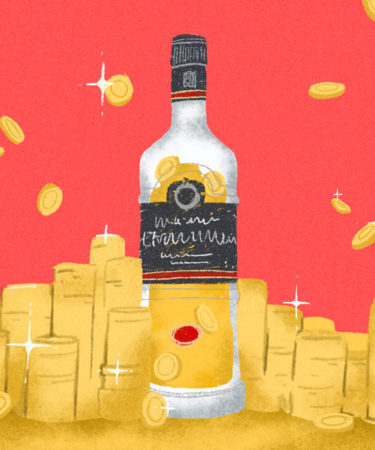Few brands in Russia are held in as high esteem as Russkij Standart Vodka. It’s immediately recognizable, and widely beloved in a country where vodka consumption is a significant part of national culture. So, when the company’s founder, billionaire oligarch Roustam Tariko, named his fledgling bank “Russkij Standart” it was said that the naming convention was really a sneaky way of getting around television broadcast rules that forbade advertising vodka. You’d hear Russkij Standart Bank, but would think Russkij Standart Vodka.
The problem with this particular story is that it’s not true.
The allegations seem to have been brought to life by a marketing guru named Max Lenderman, who wrote the book “Brand New World: How Paupers, Pirates and Oligarchs are Reshaping Business.” According to Lenderman, Tariko started Russian Standard Bank as a way of circumventing Russian laws put into place by Vladimir Putin, which banned the advertising of vodka on television. Lenderman writes: “The advertising restriction on vodka did not deter Tariko from doing business. He merely set up a bank to get around the laws. And in doing so, he became one of the most successful bankers in Europe.” (“Brand New World,” p. 34).
Lenderman’s allegations caught international attention. His tale was featured on the CBC (Canadian Broadcasting Corporation) Radio show “Under The Influence,” and from there the story insinuated itself into the history of the Russkij Standart brand.
In an email to VinePair, Dr. Mark Schrad, author of “Vodka Politics: Alcohol, Autocracy, and the Secret History of the Russian State,” points to an alternate, and more accurate, reality. “So we know Tariko’s Russian Standard vodka emerged in 1998, and the Russian Standard bank in 1999. Putin doesn’t come along until [around] 2000, and there wasn’t much of anything new in the alcohol-regulation sphere in Putin’s first term,” writes Dr. Schrad, who is also an associate professor in the Department of Political Science at Villanova University.
“Indeed, as I write in the ‘Vodka Politics’ book, the main move was to bring the Kristall distillery back ‘under center,’” says Schrad, referring to the century-old, state-owned corporation that produces Stolichnaya, among other brands. He continues, “meaning, bringing it back under the Kremlin through trusted oligarchs, rather than benefiting rival political ‘clans,’ such as Moscow mayor Yuri Luzhkov.”
Russia’s restrictions on vodka advertising and sales actually happened years before the public rise of Vladimir Putin. According to Dr. Anna Bailey, who wrote about the intersection of alcohol and politics in “Politics Under the Influence: Vodka and Public Policy in Putin’s Russia” (which Schrad peer-reviewed), vodka advertising on television was banned in 1995. Its sale in street kiosks was banned in 1997, predating Putin’s ascent. Lenderman’s claim that Tariko was trying to circumvent rules put in place by Putin simply doesn’t add up.
A more accurate version of Lenderman’s tale might say Tariko was leveraging the Russkij Standart name — just not to circumvent the law. According to Schrad, Tariko “wanted to have a premium brand that just exuded ‘quality.’ So he gave it the nationalistic name of ‘Russkij Standart.’” That same nomenclature was later used for his other companies in order to leverage the loyalty that people had built toward the Russkij Standart Vodka brand.
All things considered, this decision was remarkable: Tariko built a brand where brand loyalty, effectively, didn’t exist. Russian Standard Vodka continues to thrive today, as the world’s top-selling Russian premium vodka.
